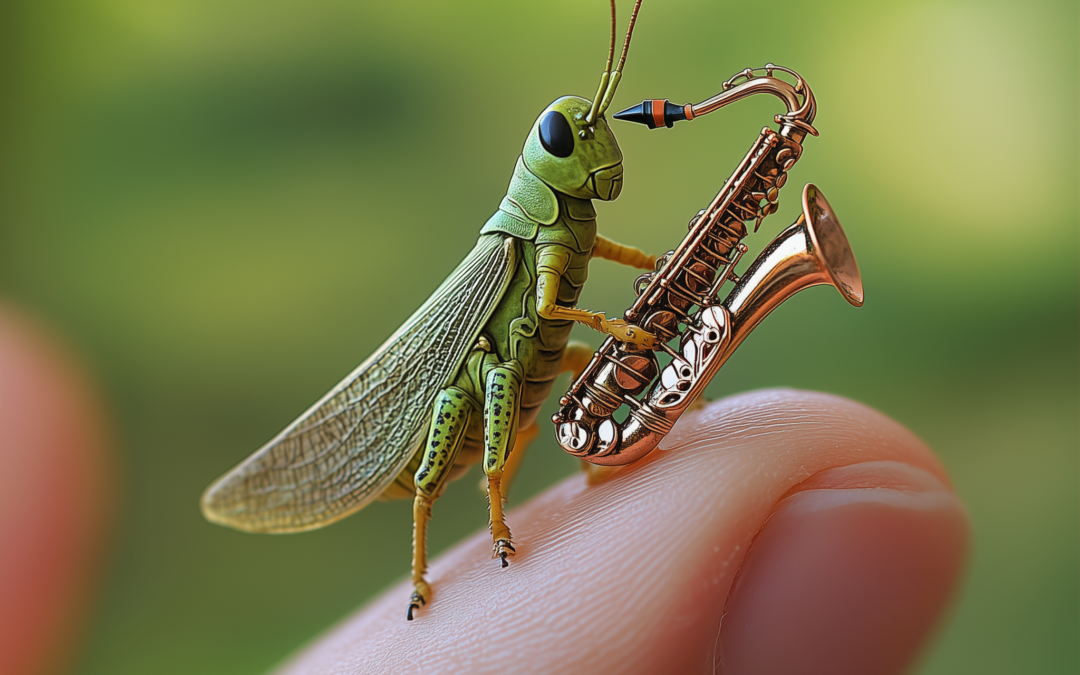Why Do Grasshoppers Make Sounds?
Grasshoppers produce sounds primarily to communicate, especially during mating season. The sounds we hear, commonly known as “stridulation,” are produced when the grasshopper rubs its hind legs against its forewings. These sounds serve different purposes, including:
- Attracting mates: Male grasshoppers use these sounds to call out to females, signaling their availability for mating.
- Marking territory: Some grasshoppers may also use sounds to establish and defend their territory, warning others to stay away.
- Predator defense: In some cases, the sound can deter potential predators, signaling that the grasshopper may not be worth the effort.
There are different species of grasshoppers, and each produces its own unique sound. The frequency, rhythm, and duration of their calls can vary, making it possible to identify some species just by their sounds. Interestingly, while grasshoppers are related to crickets, they create noise differently—crickets rub their wings together to chirp.
How Do Grasshoppers Produce Their Sounds?
Grasshoppers use a process called stridulation to produce their signature sounds. Here’s how it works:
- Rubbing legs against wings: Grasshoppers have ridged hind legs, which they rub against their forewings. This motion creates the sounds we hear as chirping or buzzing.
- Amplifying the sound: The forewings of the grasshopper act as an amplifying chamber, boosting the volume of the sound. This helps them broadcast their call over long distances.
- Rhythm and frequency: The rhythm and pitch of the sound can vary based on the species and their purpose. For example, males often change their sound patterns when they detect a female nearby.
These sounds are an essential part of grasshopper communication, allowing them to connect with other members of their species. The ability to make and hear sounds is critical for their survival and reproduction.
The Grasshopper’s Role in the Ecosystem
Grasshoppers play a crucial role in the ecosystem, despite often being seen as pests. They are herbivores, primarily feeding on grasses and other vegetation, and serve several ecological functions:
- Food source for predators: Grasshoppers are an important food source for many predators, including birds, rodents, reptiles, and spiders. In this way, they help sustain various food chains in ecosystems.
- Plant population control: By feeding on grasses and other plants, grasshoppers help manage plant populations. While they can sometimes damage crops, in natural environments, this grazing helps maintain biodiversity by preventing any one plant species from becoming too dominant.
- Nutrient cycling: When grasshoppers feed on plants, they help break down vegetation, turning it into nutrients that can be recycled into the soil. Their waste, in turn, enriches the soil with organic material, promoting healthy plant growth.
- Pollination assistance: Although not as efficient as bees or butterflies, grasshoppers contribute to pollination as they move between plants, inadvertently spreading pollen. This minor role in pollination can still impact plant reproduction in the ecosystems where they thrive.
Despite their importance, grasshoppers can become a nuisance, particularly in agricultural areas. Large populations can devastate crops and gardens, leading to economic losses for farmers. In these cases, pest control measures may be necessary to mitigate their impact.
When Grasshoppers Become a Pest
In some cases, grasshopper populations can spike, especially during warm, dry conditions. This can lead to significant damage to gardens, crops, and ornamental plants. Signs of grasshopper infestation include:
- Jagged holes in leaves and plants
- Chewed stems or completely eaten plants
- Increased presence of grasshopper sounds during the day
If left unchecked, large swarms of grasshoppers can cause widespread damage, especially to farmers and home gardeners. Grasshoppers can consume up to half of their body weight in a single day, making them voracious eaters.
While natural predators like birds and spiders help control grasshopper populations, sometimes additional pest control measures are needed to protect crops and landscapes. Eco-friendly pest control solutions are available, minimizing harm to other beneficial insects and wildlife.
How to Manage Grasshoppers in Your Garden
Here are some DIY tips to help manage grasshoppers in your yard:
- Plant barriers: Consider planting crops like cilantro, marigold, or calendula, which grasshoppers tend to avoid.
- Use row covers: Physical barriers, such as row covers, can protect your garden from grasshopper feeding.
- Encourage natural predators: Attract birds or beneficial insects to your garden by planting diverse, native species that provide habitat for them.
- Neem oil spray: Neem oil can be an effective organic solution for deterring grasshoppers from feeding on plants.
However, if you’re dealing with a large infestation, professional pest control may be necessary to safeguard your landscape or crops.
Preserving Grasshopper Populations While Managing Pests
It’s important to recognize that grasshoppers, while sometimes a nuisance, are vital to the ecosystem. Overuse of pesticides can harm not only grasshoppers but also other beneficial insects and animals. Eco-friendly pest control methods can help manage grasshopper populations without damaging the broader environment. At EcoCare, we specialize in humane, eco-friendly pest control solutions that help protect your garden while preserving the natural balance of your local ecosystem.

